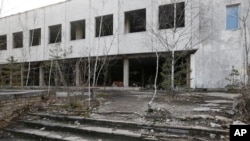Emergency authorities in Ukraine say there are no signs of any fire still burning in the uninhabited exclusion zone around the decommissioned Chernobyl nuclear plant after firefighters mobilized to put out a blaze.
The country's State Emergency Service said early on Sunday that background radiation levels were "within normal limits."
More than 130 firefighters, three aircraft, and 21 vehicles were deployed on April 4 to battle the fire, which was said to have burned around 20 hectares (50 acres) in the long-vacated area near where an explosion at a Soviet nuclear plant in 1986 sent a plume of radioactive fallout high into the air and across swaths of Europe.
Fire and safety crews were said to be inspecting the area overnight on April 4-5 to eliminate any threat from sites where there was still smoldering.
The blaze required seven airdrops of water, officials said.
The Ukrainian State Emergency Service said that "as of April 5, 7:00 a.m., there was no open fire, only some isolated cells smoldering."
It said firefighters hadn't seen any flames since around 8:00 p.m. on April 4.
Officials had earlier shared images taken from an aircraft of white smoke blanketing the area, where it said firefighting was complicated by "an increased radiation background in individual areas of combustion."
There was no threat to settlements, the State Emergency Service said.
A number of regions of Ukraine this week have reported brushfires amid unseasonably dry conditions.
Fires are a routine threat in the forested region around the exclusion zone where an explosion 33 years ago ripped a roof off the fourth reactor at the Chernobyl nuclear power plant near the now-abandoned town of Pripyat.
The 1986 explosion sent a cloud of radioactive material high into the air above then-Soviet Ukraine, Belarus, and Russia, as well as across Europe as Soviet officials denied there had been any accidents.
Dozens of people in Ukraine died in the immediate aftermath of the Chernobyl disaster, and thousands more have since died from its effects, mainly exposure to radiation.
A second massive protective shelter over the contaminated reactor was completed in 2016 in hopes of preventing further radiation leaks and setting the stage for the eventual dismantling of the structure.




